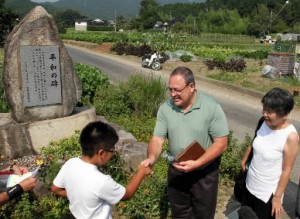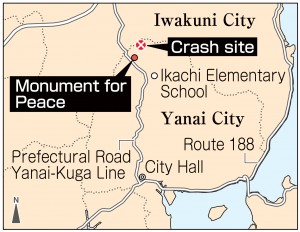Nephew of U.S. soldier killed in Hiroshima A-bombing visits site of plane crash and capture
Aug. 27, 2015
by Ryutaro Inoue, Staff Writer
At the tail end of World War II, a U.S. plane was shot down and crashed in western Japan. A soldier who bailed out of the plane was captured and taken to Hiroshima as a prisoner of war, then was killed in the atomic bombing. On August 4, the nephew of that soldier visited the crash site in the town of Ikachi, part of Yanai City, for the first time. The nephew, Ralph Neal, 58, is a clergyman from the U.S. state of Kentucky who has the same first name as his uncle. He met and spoke with some of the children of Ikachi, as well as residents who witnessed the crash 70 years ago, and they shared their wishes for peace.
At the end of July 1945, a B24 bomber carrying Mr. Neal’s uncle, a gunner, was hit above the waters off Kure and came down in Ikachi. His uncle parachuted from the stricken plane and was taken to the Chugoku Military Police Headquarters in Naka Ward, Hiroshima. He and five other crew members lost their lives when they experienced the atomic bombing of Hiroshima on August 6. The pilot of the plane, Thomas Cartwright, who died this past January at the age of 90, escaped the bombing because he was transferred to Tokyo prior to the A-bomb attack.
Mr. Neal said that, during his childhood, he often heard how his uncle had been a pillar of the family, who took good care of his younger brothers and sisters. To honor his brother, Mr. Neal’s father named him after his uncle.
After the war, the residents of Ikachi returned some pieces of the plane to the United States and cultivated a close friendship with Mr. Cartwright. On August 4, they welcomed Mr. Neal in front of the “Monument for Peace,” which was raised near the crash site in 1998, and told him what they saw of the plane crash and his uncle’s capture.
Mr. Neal said he learned that the town of Ikachi bears strong similarities to his uncle’s hometown and that, to put an end to war and its tragedies, human beings must continue to pursue peace.
(Originally published on August 5, 2015)
At the tail end of World War II, a U.S. plane was shot down and crashed in western Japan. A soldier who bailed out of the plane was captured and taken to Hiroshima as a prisoner of war, then was killed in the atomic bombing. On August 4, the nephew of that soldier visited the crash site in the town of Ikachi, part of Yanai City, for the first time. The nephew, Ralph Neal, 58, is a clergyman from the U.S. state of Kentucky who has the same first name as his uncle. He met and spoke with some of the children of Ikachi, as well as residents who witnessed the crash 70 years ago, and they shared their wishes for peace.
At the end of July 1945, a B24 bomber carrying Mr. Neal’s uncle, a gunner, was hit above the waters off Kure and came down in Ikachi. His uncle parachuted from the stricken plane and was taken to the Chugoku Military Police Headquarters in Naka Ward, Hiroshima. He and five other crew members lost their lives when they experienced the atomic bombing of Hiroshima on August 6. The pilot of the plane, Thomas Cartwright, who died this past January at the age of 90, escaped the bombing because he was transferred to Tokyo prior to the A-bomb attack.
Mr. Neal said that, during his childhood, he often heard how his uncle had been a pillar of the family, who took good care of his younger brothers and sisters. To honor his brother, Mr. Neal’s father named him after his uncle.
After the war, the residents of Ikachi returned some pieces of the plane to the United States and cultivated a close friendship with Mr. Cartwright. On August 4, they welcomed Mr. Neal in front of the “Monument for Peace,” which was raised near the crash site in 1998, and told him what they saw of the plane crash and his uncle’s capture.
Mr. Neal said he learned that the town of Ikachi bears strong similarities to his uncle’s hometown and that, to put an end to war and its tragedies, human beings must continue to pursue peace.
(Originally published on August 5, 2015)








